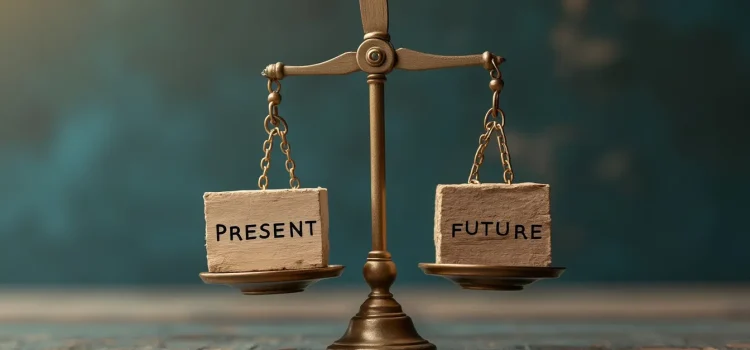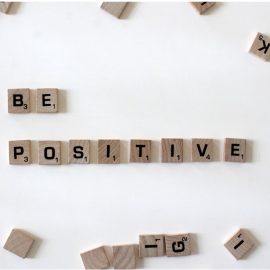
Are you struggling to balance happiness now with anticipation for tomorrow? How can you create a life where contentment and excitement coexist?
In his book The Code of the Extraordinary Mind, Vishen Lakhiani suggests that being happy in the present while remaining excited about the future is the ideal state of being. This balance requires separating your happiness from achievement of major goals.
Read on to discover how you can maintain excitement about the future you’re creating while not losing sight of each moment.
Maintaining Excitement About the Future
As you continue to update your beliefs and habits, Lakhiani promises you’ll move closer to an ideal state of being—one where you’re happy in the present moment and yet excited about the future.
This is a difficult balance to strike, and the author says that finding it requires moving away from the traditional idea that your happiness comes from achieving major life goals. Instead, create a bold and exciting vision of your future, but recognize that you can be happy while working toward it. By separating your concept of happiness from your vision of the future, you can be content with your life as it is—yet still look forward to even better things to come.
For example, becoming a millionaire is a fairly common life goal, and people pursue it because they think wealth will make them happy. However, in the process, they often make themselves miserable by devoting their lives to jobs they hate, just because those jobs pay well. If such a person were to recognize that becoming a millionaire isn’t actually a prerequisite for being happy, they could find a job that suits them better (even if it pays less). By doing so, they could start to find contentment in the present, while still looking forward to the day when their wealth crosses that million-dollar threshold and seeking out ways to make that happen.
| People Evolved to Focus on the Future Lakhiani’s principle that the ideal state is one where you’re both happy now and excited for the future closely echoes what Daniel Z. Lieberman and Michael E. Long write in The Molecule of More. However, they add that it’s so hard to find the balance between those two feelings because our brains are wired to respond much more strongly to future possibilities than to present-day circumstances. Lieberman and Long explain that our innate focus on the future is an evolutionary holdover from a time when people needed to be constantly searching for more and better things in order to survive. Our ancient ancestors needed to hunt and gather food, find or build secure shelters, and so on. If they’d been content with what they already had, they most likely wouldn’t have survived (and therefore we wouldn’t exist today). The authors suggest balancing contentment with anticipation by finding a job or hobby that demands your full attention in the present, but also gives you long-term goals to strive toward. For example, making art is one way to do this: You need to focus all of your attention on what you’re making at the moment, but you also need to have a vision of what the finished product will look like—and, looking even further ahead, perhaps goals such as selling your art, getting it into a gallery, or winning a competition. |
Training Yourself to Be Happy
The first part of striking this balance is finding happiness in your present circumstances, whatever they may be. Lakhiani argues that this is possible because happiness is a skill you can practice—or, more accurately, a set of three skills that he urges you to practice daily.
The first skill is thankfulness. Lakhiani suggests that you spend a few minutes each morning and evening thinking about what you’re grateful for, both in your personal life and your professional life. It doesn’t matter whether anyone else would think these things are important or worth celebrating, as long as they’re meaningful to you. For each one you think of, take a few moments to deeply feel and appreciate the positive feelings it creates within you.
The second skill Lakhiani urges you to practice is letting go. Many of us hold onto anger and grudges for past wrongs and sabotage our happiness by doing so. Letting go of those negative feelings is crucial for creating real, lasting contentment.
Lakhiani’s process for letting go of anger is similar to the skill of thankfulness. Begin by closing your eyes and remembering the event that upset you as clearly as possible and the person or people responsible for it. Allow yourself to fully feel the hurt and anger of being wronged. However, don’t remain in this state for more than a few minutes, or you run the risk of reinforcing your grudge rather than working through it.
Finally, try to find feelings of compassion regarding what happened to you. Consider what might have led the other person to act the way they did, and whether you’d have done any better in their position. You can also consider how the experience might have taught you an important lesson or spurred you to become a better person in some way.
Lakhiani warns that you may need to repeat this process many times to fully let go of the negativity, but promises that you’ll feel a bit better with each repetition. Eventually you’ll reach a point where you’re comfortable forgiving the person and moving on from what happened.
The third skill is contribution, which means helping others and making the world better. Lakhiani explains that people tend to think of “helping” only in terms of either doing physical labor or donating money, but there are many other ways you can contribute to others’ well-being. For example, you could teach professional or life skills that you excel in, and give advice based on exceptional experiences you’ve had (good or bad). There are also opportunities to help out in your local community, such as volunteering at a community center or joining a neighborhood cleanup crew.
Designing Your Own Version of Success
You can become content in the present. Another part of Lakhiani’s ideal mindset is excitement about the future. To cultivate that sense of anticipation, he recommends rebuilding your personal vision of success from the ground up and designing a future you can truly look forward to.
Do this by thinking about three important questions.
1. “What do I want to experience?” If you had the personal and financial freedom to do anything you wanted, what kinds of experiences would you seek out? For example, some people dream of traveling the world, while others imagine a quiet life as the owner of a local shop or as a stay-at-home parent.
2. “Who do I want to be?” Consider what kind of person you’d need to be in order to live out your answers to the previous question. Also think about what changes you’ll need to make—what kinds of personal development you’ll have to undergo to get from the person you are to a person who can have those experiences. If you want to travel the world, you most likely need money and courage, and few personal commitments keeping you home. On the other hand, to start a small business or raise a family, you need to be someone who can fully devote yourself to those kinds of responsibilities.
3. “How do I want to help?” Remember that the third happiness skill Lakhiani urges you to develop is contribution. Therefore, your answer to this question will help guide you toward both present contentment and future excitement. Try thinking about it in two parts: how you can help others every day starting now, and how you can help others after you’ve become the person you envisioned in Question #2.






